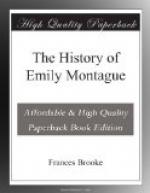I love pleasure, and think it our duty to make life as agreable as is consistent with what we owe to others; but a true pleasurable philosopher seeks his enjoyments where they are really to be found; not in the gratifications of a childish pride, but of those affections which are born with us, and which are the only rational sources of enjoyment.
When I am walking in these delicious shades with Emily; when I see those lovely eyes, softened with artless fondness, and hear the music of that voice; when a thousand trifles, unobserved but by the prying sight of love, betray all the dear sensations of that bosom, where truth and delicate tenderness have fixed their seat, I know not the Epicurean of whom I do not deserve to be the envy.
Does your fortune, my dear Temple, make you more than happy? if not, why so very earnestly wish an addition to mine? believe me, there is nothing about which I am more indifferent. I am ten times more anxious to get the finest collection of flowers in the world for my Emily.
You observe justly, that there is nothing so insipid as women who have conversed with women only; let me add, nor so brutal as men who have lived only amongst men.
The desire of pleasing on each side, in an intercourse enlivened by taste, and governed by delicacy and honor, calls forth all the graces of the person and understanding, all the amiable sentiments of the heart: it also gives good-breeding, ease, and a certain awakened manner, which is not to be acquired but in mixed conversation.
Remember, you and my dear Lucy dine with us to-morrow; it is to be a little family party, to indulge my mother in the delight of seeing her children about her, without interruption: I have saved all my best fruit for this day; we are to drink tea and sup in Emily’s apartment.
Adieu! Your
affectionate
Ed.
Rivers.
I will to-morrow shew you better grapes than any you have at Temple-house: you rich men fancy nobody has any thing good but yourselves; but I hope next year to shew you that you are mistaken in a thousand instances. I will have such roses and jessamines, such bowers of intermingled sweets—you shall see what astonishing things Emily’s taste and my industry can do.
LETTER 204.
To Mrs. Fitzgerald.
Bellfield, Oct. 22.
Finish your business, my dear girl, and let us see you again at Bellfield. I need not tell you the pleasure Mr. Fitzgerald’s accompanying you will give us.
I die to see you, my dear Bell; it is not enough to be happy, unless I have somebody to tell every moment that I am so: I want a confidante of my tenderness, a friend like my Bell, indulgent to all my follies, to talk to of the loveliest and most beloved of mankind. I want to tell you a thousand little instances of that ardent, that refined affection, which makes all the happiness of my life! I want to paint the flattering attention, the delicate fondness of that dear lover, who is only the more so for being a husband.




